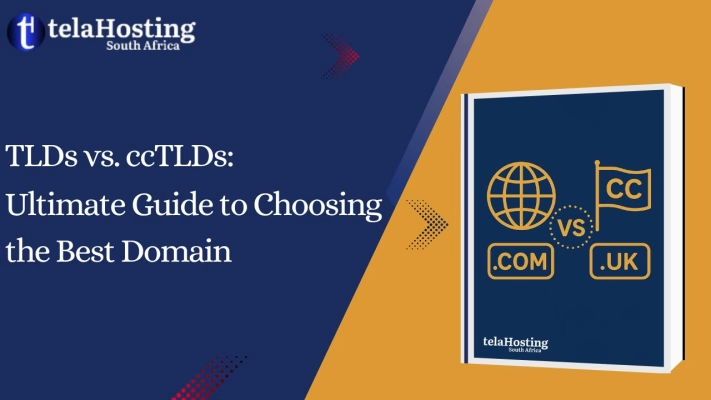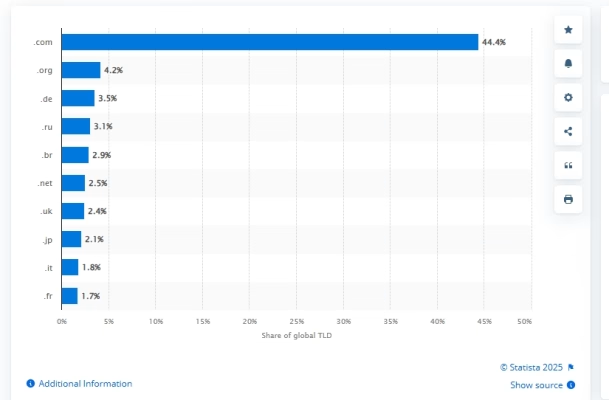
To help you understand how TLDs and ccTLDs work, in this post, I’ll use simple illustrations to make the concepts clear and easy to read and grasp.
When you visit a website, you may notice the domain extension; basically the part after the dot, such as .com, .org, or .net. These extensions are known as Top-Level Domains (TLDs). For businesses and individuals with a local focus, especially in South Africa, Country Code TLDs (ccTLDs) like .za play a crucial role. This article breaks down what TLDs and ccTLDs are, how they differ, and why they matter for your online presence.
Come on with me let’s get it broken down!
What Are Top-Level Domains (TLDs)?
Top-Level Domains (TLDs) are the highest-ranking extensions in the Domain Name System (DNS). These domains are not tied to any country and can be used by individuals, businesses, or organizations worldwide.
Examples of TLDs:
- .com – Commercial websites (most popular)
- .org – Non-profit organizations
- .net – Originally for networking services, now widely used
- .edu – Reserved for educational institutions
- .gov – Government institutions (restricted use)
- .tech, .shop, .blog, .app – Newer, industry-specific TLDs
It is clear why I place the .com domain as the first and in a bracket added “Most Popular“. The reason is quite simple. It is basically because the .com domain as of 2025, remains the most popular TLD, accounting for approximately 44.4% of all registered domains on the internet, according to Statista.
Most popular top-level domains worldwide as of February 2025

Advantages of TLDs:
✅ Global Appeal – Ideal for businesses targeting an international audience.
✅ Higher Recognition – Extensions like .com and .org are universally recognized and trusted.
✅ Flexibility – Suitable for any type of business, blog, or project.
✅ SEO-Friendly – Works well for worldwide search visibility.
Disadvantages of TLDs:
❌ More Competition – Popular TLDs like .com are often taken.
❌ May Not Rank Well Locally – For country-specific businesses, a ccTLD may provide better local SEO results.
TLDs are managed by international organizations and can be used by anyone, regardless of geographic location.
What Are Country Code TLDs (ccTLDs)?
Country Code TLDs (ccTLDs) are specific to a country or territory and are based on ISO 3166-1 alpha-2 codes. Examples include:
Examples of ccTLDs:
- .za – South Africa
- .uk – United Kingdom
- .us – United States
- .ca – Canada
- .ng – Nigeria
- .de – Germany
- .in – India
For South African businesses, .za domains (such as .co.za, .net.za, .sch.za, and .edu.za) can enhance local trust and brand identity, making it easier to connect with local customers and improve local SEO.
Case Studies and Local Examples
Many South African businesses have benefited from using a .za domain. For instance, several local e-commerce platforms and startups have reported increased consumer trust and higher conversion rates after switching to a .za domain. This local appeal not only boosts credibility but also enhances search engine visibility in South Africa.
Which Domain Extension is Right for You?
- If you want global reach, go for a TLD like .com.
- If you want local trust and SEO benefits, choose a ccTLD like .za.
- If possible, secure both a TLD and ccTLD to cover all bases!
Comparison of TLDs vs. ccTLDs
| Aspect | TLDs (e.g., .com, .org) | ccTLDs (e.g., .za, .ke) |
|---|---|---|
| Global vs. Local | Global appeal; used worldwide | Country-specific; emphasizes local identity |
| Usage | Suitable for international and commercial sites | Ideal for businesses targeting local markets (e.g., .za for South Africa) |
| Trust & Credibility | Recognized globally; may lack local nuance | Instills local trust; signals regional focus |
| Registration Cost & Renewal | Varies; typically higher for popular global TLDs | Often competitively priced for local markets with tailored renewal policies |
| SEO Impact | Effective for global SEO; ranking depends on content relevance | Boosts local SEO; helps in location-based searches, especially in South Africa |
Why Many South African Businesses Use .za Domains
South African businesses increasingly choose .za domains (especially .co.za) because they offer a strong combination of local trust, credibility, and search visibility. Consumers in South Africa often see a .za website as more reliable, transparent, and relevant to their needs compared to a generic .com or .net domain. For instance:
- E-commerce Stores –Many South African online retailers use .co.za domains to highlight that they are locally based, which builds consumer trust. For example, Takealot.com also operates under takealot.co.za.
- Banks & Government Websites – South African government and financial institutions rely on .gov.za and .bank.za domains to establish authority and credibility. For instance, the South African Reserve Bank (resbank.co.za) and official government sites like gov.za use these domains to signal legitimacy.
- Tech Startups – South African startups often begin with .co.za domains to build a strong presence in the local market before scaling internationally. Companies like Yoco.co.za and SweepSouth.com first grew their reputation at home with .za domains before expanding into broader markets.
By using a .za domain, businesses can rank higher in South African search results, making it easier for local customers to find them.
When Should You Choose a TLD vs. a ccTLD?
| Choose a TLD if… | Choose a ccTLD if… |
|---|---|
| You want a global audience. | You want to target a specific country. |
| Your business has no geographic limitations. | Your customers are mainly in one country. |
| You need a widely recognized extension like .com. | You want to boost local SEO with a .za or similar domain. |
| You want to expand internationally in the future. | You want to build strong local credibility. |
Expert Insights
According to Philip Munason, a digital marketing strategist based in Johannesburg, “Choosing a .za domain has been a game changer for South African businesses. It builds trust, enhances credibility, and significantly improves local SEO, making brands more relatable and accessible to South African consumers.”
For further reading, check out our article on Simple Guides to Domain Name.
FAQs
Q1: What is the main difference between a TLD and a ccTLD?
A TLD is a general domain extension like .com or .org, whereas a ccTLD is specific to a country – for example, .za for South Africa.
Q2: Why should a South African business consider using a .za domain?
A .za domain emphasizes local relevance, builds trust among local customers, and can boost local SEO by targeting region-specific searches.
Q3: Are there any additional benefits to using a ccTLD like .za?
Yes, ccTLDs can offer competitive registration costs, renewal policies tailored to local markets, and enhanced user trust due to their regional focus.
Q4: Can I register a ccTLD if my business serves a global audience?
Absolutely. Many businesses register both global TLDs and ccTLDs to cater to different segments of their audience. This dual approach can improve both global reach and local trust.
Q5: How do ccTLDs impact website security?
While a ccTLD itself does not inherently enhance security, local registrars often provide security features and support tailored to their market, contributing to overall website protection.
Q5: Does telaHosting offer ccTLDs?
Yes, telaHosting allows registrations and transferring in of ccTLDs like .za, .ke, .uk, among many other ccTLDs domains.
Conclusion
Understanding the differences between TLDs and ccTLDs is key to choosing the right domain extension for your website. Whether you aim to reach a global audience with a .com or target local customers with a .za, each option offers unique benefits. By selecting the appropriate extension, you can build trust, boost your SEO, and enhance your online presence.
Ready to boost your local presence? Register your .co.za domain with telaHosting today and join the growing number of South African businesses building trust with a local identity!